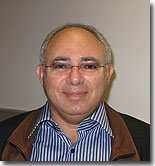Microsoft Big Brains: Wael Bahaa-El-Din

Just before retiring from day-to-day responsibilities at Microsoft, Chairman Bill Gates said that he expected Microsoft's 22 Technical Fellows to get a lot more publicly visible -- now that they wouldn't be living in his shadow. While some of the Microsoft fellows already have been active on the public-speaking circuit, many of them are not widely known outside the company.
Last year I launched this series -- "Microsoft Big Brains" -- to help remedy that shortcoming. In the coming weeks, I am hoping to profile as many of the company's tech fellows as to whom I can get access.
Microsoft's Technical Fellows came to the company via a variety of different routes. Some of them run divisions inside the company; some focus on particularly thorny technical issues that may span a variety of product units. Regardless of where they sit in the organization, the fellows all have been charged with helping Microsoft craft its next-gen products and strategies, much the way that Gates used his regular "Think Weeks" to prioritize what Microsoft needed to do next.

At Microsoft, it takes a lot of people to develop and deliver an operating system. I've seen estimates of there being more than 5,000 developers on Windows client alone. So it's not surprising that many of these individuals -- even ones with serious pedigrees and far-reaching contributions -- are behind-the-scenes types.
Technical Fellow Wael Bahaa-El-Din is one of these contributors. I'd never heard of Bahaa-El-Din prior to having a chance to interview him. Yet this is someone who has more than 1,200 individuals working for him in the Windows Fundamentals Group. Bahaa-El-Din reports to Jon DeVaan, the head of Microsoft's Core Operating System Division (COSD). He and his team touch many back-room aspects of Windows' development, from the daily builds, to the testing and development tools, to the oversight of the release criteria, to "serviceability" (the release and delivery of updates and service packs).
Currently, Bahaa-El-Din is completely focused on seeing Windows 7 through to release-to-manufacturing (RTM). (After that, he'll "see what's next" for him, he says.)
"The goal is having a great build every day that is self-hostable. Its performance and compatibility needs to be very good," he says.
Because of the sheer scale of Windows (there are 1.2 billion Windows users out there, and counting, Bahaa-El-Din says), innovations are important throughout the development, testing and fedback processes. With about 1.5 million Windows 7 beta testers out there, many of which are submitting bug reports, "we need to be able to fix their problems in just a few months." Add to that the feedback from users of the 62,000 machines that are self-hosting Windows 7 inside Microsoft right now, and the magnitude of Bahaa-El-Din's charter becomes quickly apparent.
Bahaa-El-Din spearheads Microsoft's quality-improvement processes for Windows client. "Quality," in this case, has a very specific meaning: It refers to the reliability, performance, compatibility, acessability -- all of those amorphous "qualities," which, collectively, distinguish a "good" operating-system release from a not-so-good one. The new level of discipline Microsoft has brought to Windows 7, compared to previous Windows releases -- in terms of planning, feature cuts/check-ins, ecosystem readiness-- falls, in part, on Bahaa-El-Din, as well.
"With a system as big as Windows, things still need to seem automatic," he notes. "User questions need immediate answers. Problems need to be fixed in a reliable manner."
Yet there's no magic "quality bullet" which makes all this happen. Instead, it's Bahaa-El-Din's job to make quality improvements magically appear.
For all of the “Microsoft Big Brains” profiles, check outthe Big Brains page.